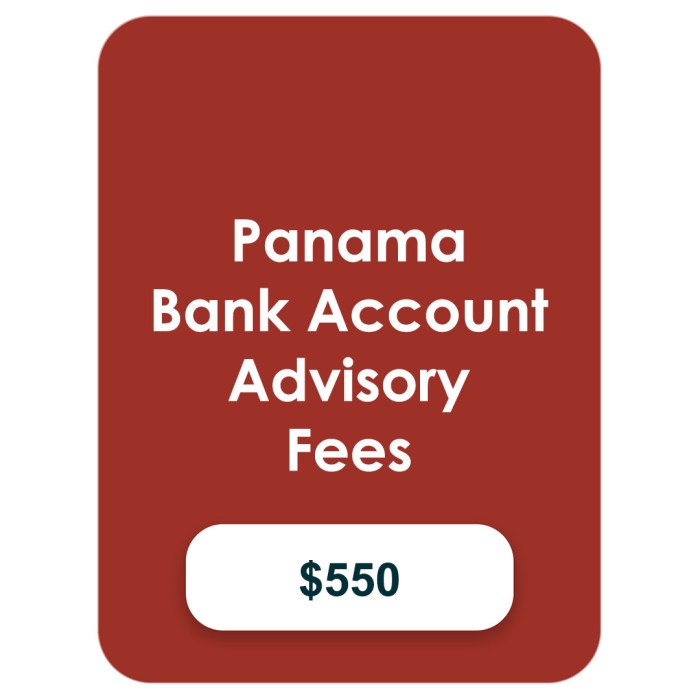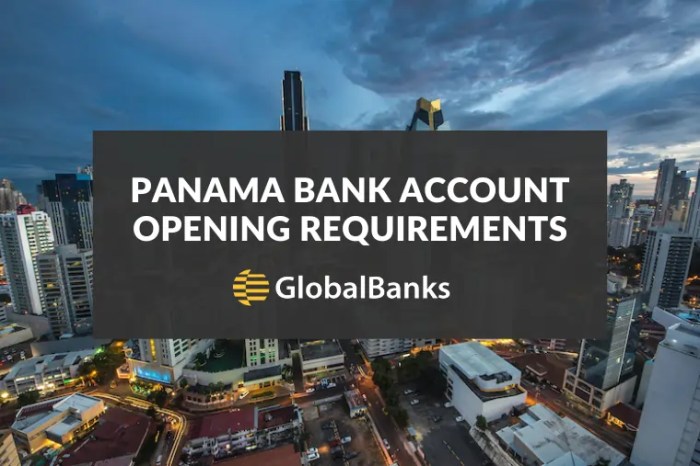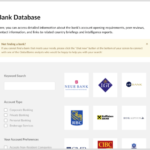Panama Bank Accounts offer a unique blend of offshore banking opportunities and challenges. Understanding the historical context of Panama’s banking system, its legal framework, and the various account types available is crucial before considering this option. This guide delves into the intricacies of opening, managing, and the associated risks of a Panama bank account, providing a balanced perspective for potential users.
We’ll explore the legal requirements, including KYC and AML regulations, and analyze the tax implications for individuals from different countries. The process of opening an account, including required documentation and application methods, will be detailed. We’ll also examine the associated fees, available banking services, and potential risks, including the impact of international sanctions. A case study will illustrate the practical aspects of opening and managing a Panama bank account, while also offering alternatives for comparison.
Account Opening Process

Opening a Panama bank account involves a series of steps and requires specific documentation. The process can vary slightly depending on the bank and the type of account being opened, but generally follows a consistent framework. Understanding these steps beforehand will streamline the application and increase the chances of a successful outcome.The process of applying for a Panama bank account typically involves either an in-person application at a branch or, in some cases, an online application, though online applications are less common for this type of account.
In-person applications often allow for a more personalized experience and immediate clarification of any questions, while online applications offer convenience but may require more follow-up communication. Regardless of the method chosen, thorough preparation of the necessary documents is crucial.
Required Documentation
The specific documents required may vary depending on the bank and the applicant’s circumstances. However, a common set of documents generally includes the following:
- Valid passport or national identity card: This serves as primary identification verification.
- Proof of address: This could be a utility bill (electricity, water, or gas), bank statement, or a recent rental agreement, all showing the applicant’s current address.
- Completed bank application form: This form will require detailed personal and financial information, and it is crucial to fill it out accurately and completely.
- Reference letters: Some banks may require reference letters from reputable sources, such as previous banks or employers, attesting to the applicant’s financial standing and character.
- Source of funds documentation: This is critical and often the most scrutinized aspect. Banks require proof of the legitimate origin of the funds intended to be deposited. This might include documentation such as business registration certificates, employment contracts, investment statements, or inheritance documents.
- Corporate documents (if applicable): If opening a corporate account, certified copies of the company’s articles of incorporation, bylaws, and registration documents will be necessary.
It is important to note that these documents must be original or certified true copies, and they may need to be translated into Spanish if they are not originally in Spanish. Failure to provide complete and accurate documentation can lead to delays or rejection of the application.
Application Methods, Panama Bank Account
Applicants can typically choose between applying for a Panama bank account in person or, in some instances, online. In-person applications usually involve visiting a branch of the chosen bank, presenting all necessary documentation, and completing the application process with a bank representative. This allows for immediate interaction and clarification of any doubts. Online applications, while convenient, may require more extensive verification procedures and often involve significant digital communication with the bank.
The availability of online applications varies considerably between different banks in Panama.
Alternatives to Panama Bank Accounts

Panama bank accounts, while offering certain benefits, are not the only offshore banking option available. Individuals seeking to diversify their assets or manage their finances internationally should consider a range of alternatives, each with its own set of advantages and disadvantages. A thorough comparison is crucial to making an informed decision based on individual circumstances and financial goals.Choosing the right offshore banking solution requires careful consideration of factors such as regulatory environment, banking fees, accessibility, and the level of confidentiality offered.
Understanding the nuances of each option allows for a more strategic approach to international financial management.
Offshore Banking in Switzerland
Switzerland has a long-standing reputation for banking secrecy and financial stability. Swiss banks are known for their robust regulatory framework and stringent security measures. However, the increased global pressure on tax transparency has led to a decrease in the level of banking secrecy compared to the past. While Swiss banks still offer a high degree of privacy, the level of confidentiality is not as absolute as it once was.
Compared to Panama, Swiss banks typically have higher minimum deposit requirements and may charge higher fees for services. Furthermore, accessing funds might involve more stringent KYC (Know Your Customer) and AML (Anti-Money Laundering) compliance procedures.
Offshore Banking in Singapore
Singapore offers a stable political and economic environment, making it an attractive location for offshore banking. The country boasts a well-developed financial infrastructure and a strong regulatory framework. Singaporean banks are known for their efficiency and transparency, though not necessarily for the same level of privacy as some other jurisdictions. Compared to Panama, Singapore generally offers more robust regulatory oversight, which can be both an advantage and a disadvantage depending on individual needs.
The transparency requirements might be more stringent, impacting the level of anonymity sought by some individuals.
Offshore Banking in the British Virgin Islands (BVI)
The British Virgin Islands are a popular offshore financial center known for their favorable tax regime and strong legal framework based on English common law. BVI banks offer a range of services, including asset protection and wealth management. Compared to Panama, the BVI offers a more established and internationally recognized legal system, potentially providing greater security and legal recourse.
However, the cost of setting up and maintaining a BVI bank account might be higher than in Panama. Furthermore, while the BVI offers privacy, the level of confidentiality is subject to international regulatory pressures and cooperation agreements.
Key Differences Between Offshore Banking Options
The choice of an offshore banking jurisdiction depends significantly on individual priorities. Below is a comparison highlighting key differences between Panama, Switzerland, Singapore, and the BVI:
- Regulatory Environment: Panama offers a less regulated environment compared to Switzerland and Singapore, while the BVI has a well-established legal framework. Singapore prioritizes transparency and strong regulatory oversight.
- Privacy and Confidentiality: Panama has historically offered higher levels of confidentiality, though this is subject to ongoing international pressure. Switzerland maintains strong privacy protections but less absolute than in the past. Singapore and the BVI balance privacy with transparency requirements.
- Costs and Fees: Panama generally offers lower costs and fees compared to Switzerland and the BVI, while Singapore’s fees are generally moderate.
- Accessibility and Ease of Account Opening: Panama’s account opening process can be relatively simpler than those in Switzerland and Singapore, which often have stricter KYC/AML compliance procedures. The BVI process is generally more streamlined than Switzerland but less so than Panama.
Ultimately, the decision of whether or not to open a Panama bank account is a deeply personal one, requiring careful consideration of individual financial circumstances and risk tolerance. This guide aims to equip you with the knowledge necessary to make an informed decision. While the potential benefits of offshore banking in Panama are attractive to some, a thorough understanding of the legal, regulatory, and financial implications is paramount.
Remember to consult with qualified financial and legal professionals before making any decisions.

